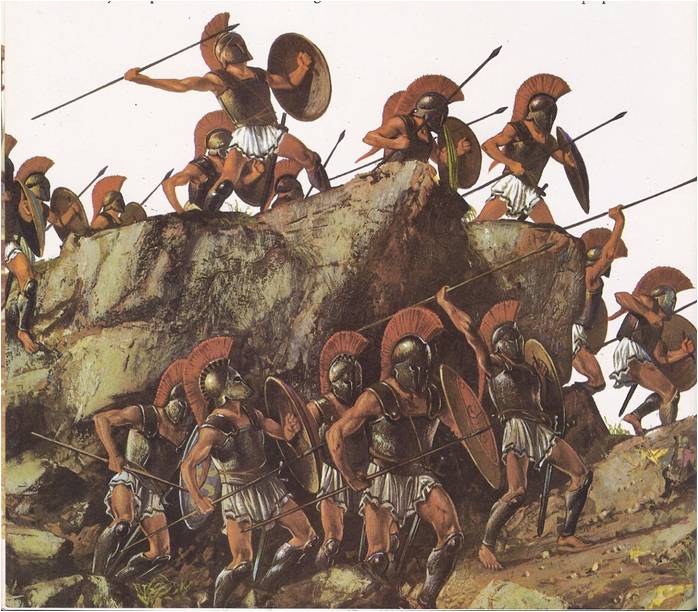The heroism of Harmodius and Aristogeiton was a myth, but Athenian democracy was not. In the two great wars of the fifth century — the Persian and the Peloponnesian — the Athenians clearly felt they had what would now be called a “way of life” which was worth fighting for. Cleisthenes, although he was of nobler blood than Solon, gave more power to the poor than Solon had done. Nearly all Athenian citizens now had a vote in the Assembly, a body which approved laws discussed in the Council of Five Hundred. The Five Hundred were elected by the citizens and anyone over thirty could be a member. As well as taking his share in lawmaking and government a citizen also played his part as a juryman in seeing that justice was done. Even the archons could be brought to trial when their year of office was over, if they were thought to have misused their power. There was a kind of police force consisting of Scythian archers which Peisistratus had set up. But they were the citizens’ servants, not his masters. There is often a good deal of argument about what is meant by a “free” country. A useful test is to ask: Can police knock on the door in the middle of the night and take people away to death or imprisonment without a public trial? If this “knock on the door” question is asked about fifth-century Athens the answer to it would be: No. There were no secret police and there were no mysterious disappearances in the middle of the night. These privileges of citizenship, however, were not shared by everyone living in Attica. “An Athenian citizen” does not mean the same as “a resident in Athens”. Neither women nor slaves might vote and immigrants from other …
Read More »Greek Against Greek 430 B. C. – 404 B. C.
About 425 B. C., a lonely man, in a country that was not his own, sat down to write the story of a war that had begun six years before. Thucydides, an Athenian, had fought in the war’s first battles. He had been a general, in command of thousands of his city’s troops. Then he was ordered to go to the aid of another commander whose men were outnumbered. When he arrived, the battle had already been fought and lost. It was not his fault but the people of Athens were too anxious about the war to consider that. They stripped Thucydides of his command and forced him to leave his homeland. Now, while the war raged on, he could only watch and he was troubled by the things he saw. Athens and its rival Sparta were caught in a deadly struggle to see which would be the master of the Greek world. Men died, cities were destroyed and nothing was gained, but the war went on. Thucydides began to write about the senseless fighting, hoping that he might teach the men of another time to avoid war. He wrote about the ambassadors from the city of Corinth, who spoke to the Spartans in their assembly, warning them about Athens. “You have no idea what kind of people these Athenians are”, the Corinthians said, “how altogether different from you. They are always thinking up new schemes and they are quick to make plans and to do something about them; but you are happy with what you have and slow to do even what is necessary. The Athenians are bold and adventurous; you Spartans are cautious and afraid to trust your own strength. They love foreign adventure, which you hate, because they think there is something to win, while you think …
Read More »Greece Fights for its Life 499 B. C.-479 B. C.
Across the Aegean, from the oriental court of King Darius of Persia, came messengers to all the city-states of mainland Greece. Their words were smooth, their smiles like sneers and they demanded gifts for their master – earth and water, the ancient tokens of tribute and surrender. The Greeks in Asia Minor already knew the Persians – too well; once the smiling messengers had come to the cities. After the messengers, the soldiers came, attacking the little poleis, one by one, until all of them were taken. Nothing could stop the Persian armies. From the capital, deep in Asia, they had pushed westward and they had gone so far that the journey home was counted in months instead of miles. They had conquered Egypt and Phoenicia, the kingdom of sailors. Now Darius, their king, meant to add Greece to his empire. He would do it quietly, if the Greeks gave up without a fight. If not, he would send his soldiers and take Greece by force. When the messengers arrived, the men of some poleis bowed their heads and gave the tokens; if Darius came, they would not fight. Others refused. The Spartans dropped the Persian ambassadors down a well and told them to find their earth and water there. At Athens, Darius’ messengers were thrown into a pit. Darius was not sorry that the Athenians were so bold. He had a grudge to settle with them and he looked forward to seeing his troops destroy their city. Seven years before, in 499 B. C., Athens and Eretria, another city on the mainland, had sent help to the Greeks in Asia Minor. When Darius was told about it, he had sneered, “The Athenians – who are they?” He had called for his bow and arrow, which he shot toward the …
Read More »Athens: City of Wisdom and War 700 B. C. to 500 B. C.
Of all the city-states in Greece, Athens was the most fortunate. The city’s guardian was Athena, the goddess of war and wisdom. Indeed, the Athenians did well in war and were blessed with wisdom. In the dark days, when barbaric invaders had conquered one city after another, Athens had not surrendered. Later, when Athens felt the growing pains that brought civil war and ruin to so many city-states, a series of wise men guided Athenians safely through their troubles. The right leaders always seemed to come along at the right time. It was more than good luck, ofcourse. The Athenians put their trust in men with new ideas and they were willing to experiment. The experiments changed an ordinary little town into a great brilliant polis that left an enduring mark on the world. Athens was old. Its story began with a list of kings so ancient that no one was quite sure when they had lived. The greatest of them was Theseus, the young hero who killed the monster at Crete. The storytellers said that he won the friendship of the neighbouring tribesmen and persuaded their chiefs to swear loyalty to his city. That was the beginning of the polis, but many years passed before it became important. In the seventh century B. C., Athens was only a second-rate, backwoods polis. Its king could do little more than dream of the glorious old days when their forefathers had defended the town’s acropolis – the Athenians called it the Rock – against the barbarians. Attica, the countryside around the old fortress on the Rock, was really ruled by a quarrelsome lot of rival noblemen, the chiefs of the clans. These barons ran their vast estates like private kingdoms. They owned the country villages and all but owned the people in …
Read More »



